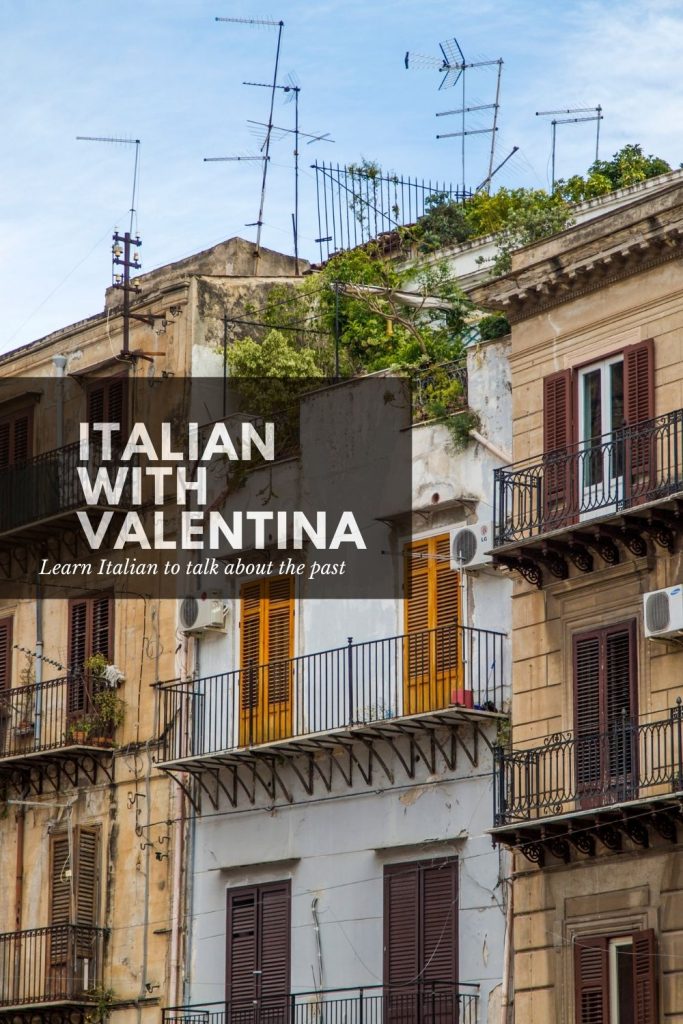
Past in Italian: Learn and Speak
In this video you’ll learn about one type of past tense in Italian: passato prossimo. It is similar in structure to the present perfect in English. Watch the video. The transcript is below to increase your understanding.
Transcript
Ciao a tutti, in questo video parleremo del tempo passato.
Poiché in italiano abbiamo diversi modi di esprimere il passato, in questo video ci concentreremo in particolare sul passato prossimo che corrisponde in inglese al present perfect ovvero un tempo passato che indica appunto un periodo non troppo distante dal momento in cui si parla.
Ad esempio viene usato con espressioni di tempo quali “l’anno scorso o la scorsa settimana”. Per formare questa tipologia temporale mettiamo innanzitutto il soggetto (io, tu, egli, noi, voi, essi), poi l’ausiliare ciò il verbo essere o avere coniugato secondo il soggetto al tempo presente e il verbo principale al participio passato.
Ad esempio: “Cosa hai fatto ieri?” “Ieri ho mangiato il gelato”.
“Cosa hai fatto l’anno scorso?” “Sono stato al mare”.
Per la forma interrogativa generalmente il tono di voce tende ad essere crescente. “Cosa hai fatto ieri?” “Ieri ho giocato a tennis”.
Per esprimere invece la forma negativa mettiamo il soggetto, la negazione che si esprime con l’avverbio “non” seguita dall’ausiliare essere o avere coniugato secondo la persona e il participio passato del verbo principale. Ad esempio: “Ieri non ho cenato”.
Un’ultima annotazione riguardo al passato prossimo. Se l’ausiliare del verbo è essere, come nella frase “io sono stato al mare”, “stato” si usa per il maschile singolare invece per il femminile si usa “stata”, “ieri sono stata in montagna”.
Per il plurale abbiamo “stati” per il maschile, “siamo stati a Venezia” e “state” per il femminile, “siamo state in Giappone”.
Here is how we do it in Italian
Learn and speak about the past in Italian:
Subject+ auxialiary verb+ past particle of the main verb
Io ho mangiato il gelato. I have eaten the ice-cream.
Tu hai mangiato il gelato. You have eaten the ice-cream.
Lui/Lei ha mangiato il gelato. He/She has eaten the ice-cream.
Noi abbiamo mangiato il gelato. We have eaten the ice-cream.
Voi avete mangiato il gelato. You have eaten the ice-cream.
Loro hanno mangiato il gelato. They have eaten the ice-cream.
Forma interrogativa- Interrogative form
Hai mangiato il gelato? Have you eaten the ice-cream?
(Lui/lei) ha mangiato il gelato? Has he/she eaten the ice-cream?
Abbiamo mangiato il gelato? Have we eaten the ice-cream?
Avete mangiato il gelato? Have you eaten the ice-cream?
Hanno mangiato il gelato? Have they eaten the ice-cream?
Forma negativa- Negative form
Io non ho mangiato il gelato. I have not eaten the ice-cream.
Tu non hai mangiato il gelato. You have not eaten the ice-cream.
Lui/Lei non ha mangiato il gelato. He/She has not eaten the ice-cream.
Noi non abbiamo mangiato il gelato. We have not eaten the ice-cream.
Voi non avete mangiato il gelato. You have not eaten the ice-cream.
Loro non hanno mangiato il gelato. They have not eaten the ice-cream.
Try creating some sentences in your journal to learn to speak about the past in Italian.
Looking for some more ideas to build fluency? http://reallifelanguage.com/reallifelanguageblog/downloads/5-week-language-learning-workbook/
We learn languages most effectively in chunks–meaningful words and phrases to communicate right away.
Italian for Travel and Beginners free book with linked audio. Get yours here: https://reallifelanguage.lpages.co/italian-for-travel-and-beginners/
https://reallifelanguage.lpages.co/italian-for-travel-and-beginners-podcast/
Looking to get started in Italian? Try learning some survival tasks. Get the free guide here:
https://reallifelanguage.lpages.co/survival-language-checklist/
Learning a new language is FUN!! Check out 20 ways to learn a language and have fun doing it:
https://reallifelanguage.lpages.co/20-fun-activities-to-learn-a-language/
Want to master a language in the next year? Check out the course here: https://real-life-language.teachable.com/p/the-5-week-linguist